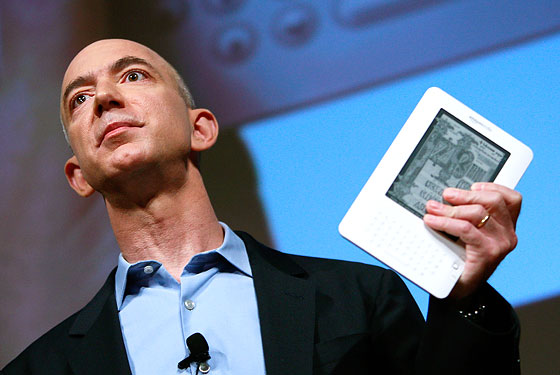
Despite a fog of mystery that would impress even Apple execs, we knew what was coming today from Amazon, thanks to leaked photos and a delivery backlog on Kindle 1.0 that began back in November. So here it is, the Kindle 2. (ItÔÇÖs officially out February 24.)
Jeff Bezos, paying tribute to the information systems (and moguls) of the past by holding his press conference at the Morgan Library, read off all the new features, showcased the sleek new design, and had Stephen King read his story about a Kindle, available exclusively on the Kindle, from his Kindle. Per usual, Bezos had no real numbers to offer. Though no one knows the extent of Kindle 1 sales, self-anointed Citigroup Kindle analyst Mark Mahaney recently guessed that 500,000 had been sold as of New YearÔÇÖs Day. He now estimates sales will reach $1.2 billion by next year.
Wild guesses aside, the new Kindle is a timely improvement. As thin as the ad-depleted magazines it can now compete with, with a 3G network that allows downloads of books, news sources, blogs, e-mailed Word and PDF documents, and Wikipedia without any network charges, Kindle 2 is to text what the iPhone is to pretty much everything else. The price remains at $359 even as media-savvy consumers are losing their jobs, but over the long term it promises to pay off for even moderate readers (given theyÔÇÖd save $15 on every e-book they buy instead of a physical one). So what Kindle 2 really is is a thought experiment: How many readers, not just of books but of print in general, are out there who consume 20 titles over an easily foreseeable period of time? How many ÔÇ£serious readersÔÇØ are left? And will reading devices save them from the enticements of multimedia, or merely offer a niche experience to the kind of person who brags that she doesnÔÇÖt own a TV?
From a technological standpoint, the interesting question is how many portable devices people will want to have, and whether the devices will converge, or diverge, depending on demographic preference. Perhaps design geeks and status-seekers will have the iPhone, corporates and politicos the Blackberry, bookish types the Kindle (or a new device that would also be a phone). The possibility exists, given the new, user-friendly, more easily adopted Kindle, that people might want a couple of devices that do selected things very, very well, instead of one that does everything passably.

